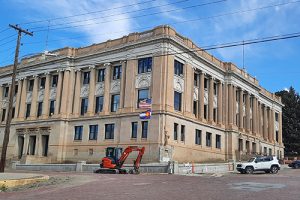Huerfano County could be home to over 15 commercial marijuana grows by the end of the year
WALSENBURG– The Huerfano County Commissioners passed Resolution 15-18 on Tuesday, tightening up and clarifying the rules and regulations regarding commercial marijuana production for all unincorporated areas of the county. This resolution is in response to the approaching deluge of applications to grow in the county. There are currently four permits for grows in the county, with two more winding their way through the process, and another eight to ten waiting for the moratorium placed on April 21 by the commissioners to be lifted. This does not take into account the two permits the City of Walsenburg has issued to commercial grows. The commissioners had been watching with growing alarm as, under old regulations, commercial pot greenhouses were allowed to build on 35-acre ranchettes in the Buffalo Ranch area, some with sketchy or unreliable water supply, and some with out of county developers. Planning and Zoning, taking guidance from the commissioners, submitted their revision of Section 18.00, which the
commissioners quickly adopted. Parts of the regulations are untouched, some had minor wording tweaks, and some parts had major revisions. Looking through the code, some of the changes are: the five percent county excise tax, approved by voters, remains in place. All facility owners and operators are required to have both a primary and a secondary CUP. CUPs are not transferable. Any new people operating the grow must apply for their own CUP. Secondary permit holders must supply a general land use application, an operations and business plan, proof of residency for two years, and if water is being provided, they need to have a signed contract for a minimum of five years. A minimum of 51% of a facility’s annual payroll has to be for Huerfano County residents. All construction must begin within 180 days of building permit approval, and finished within one year. Proposed new facilities located within three and a half miles of a municipality must have a commercial water tap, and facilities farther out than that must demonstrate a physical, legal source of water, and this must be supplied at the time of application. The initial review fee of $400 is for when a prospective developer wants to file an application, and goes through a conference going over all the regulations. The actual application fee is $1,300, and the operating fee is $10,000. With regulations being passed before the deadline expired on the new application moratorium, the commissioners asked county planners Steve Channel and David Bobian, who were on hand, if they thought it should be lifted yet. They thought for a second, then Bobian mentioned he had two applications he was working on that came in under the deadline, as well as writing a comprehensive plan, and he knew of eight to ten more applicant waiting for the moratorium to be lifted. “Could you use some breathing room?” Vezzani asked. “Yea, that would be nice,” replied Bobian. The 60-day moratorium will end on June 22.




